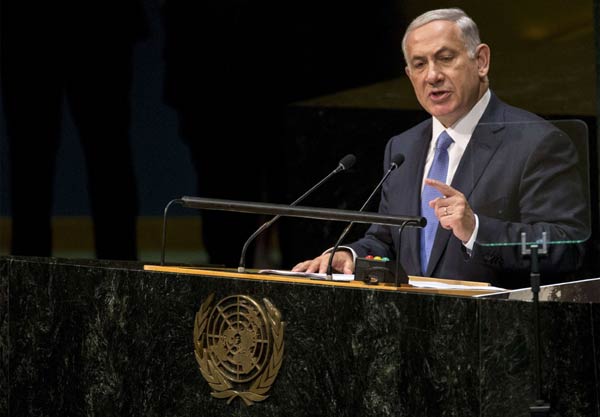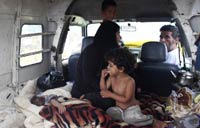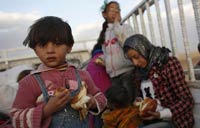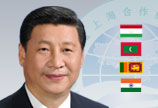Israel, Syria in accord at UN debate on fighting terrorism
(Xinhua) Updated: 2014-09-30 10:10
 |
|
Israel's Prime Minister Benjamin Netanyahu addresses the 69th United Nations General Assembly at the UN headquarters in New York September 29, 2014. [Photo/Agencies] |
 |
| Syrian crisis rattles fragile Lebanon |
 |
| Turkey embraces more refugees with growing concern |
Immediately after Prime Minister Benjamin Netanyahu of Israel mounted the rostrum, he declared, "militant Islam is on the march. It's not militants, it's not Islam, it is militant Islam and typically its first victims are other Muslims, but it spares no one: Christians, Jews, Yezidis, Kurds, no creed, no faith, no ethnic group is beyond its sight and it's rapidly spreading in every part of the world."
"ISIS (Islamic State of Iraq and Syria) and Hamas share a fanatical creed," he said, telling the assembly the "self-declared (ISIS) caliph, Abu Bakr al-Baghdadi" had said: "A day will soon come when the Muslim will walk everywhere as a master. The Muslims will cause the world to hear and understand the meaning of terrorism and destroy the idol of democracy."
"Now listen to Khaled Mashal, the leader of Hamas," Netanyahu said, "He proclaims a similar vision of the future, 'We say this to the West -- by Allah you will be defeated. Tomorrow our nation will sit on the throne of the world.'"
"So when it comes to their ultimate goals, Hamas is ISIS and ISIS is Hamas," he said. "And what they share in common all militant Islamists share in common: Boko Haram in Nigeria, al- Shabab in Somalia, Hezbollah in Lebanon, al-Nusra in Syria, the Mahdi army in Iraq, and the al-Qaida branches in Yemen, Libya, the Philippines, India and elsewhere."
"This extremist ideology does not acknowledge anything but itself, and does not recognize anything but slaughter, murder and torture," said Foreign Minister Waled Al Moulem of Syria, when he commented on ISIS. "You are witnessing today what ISIS, the most dangerous terrorist organization in the world at all in terms of funding and brutality, is doing to Syrians and Iraqis of all spectra and religions."
"This terrorist organization is enslaving women, raping them and selling them in slave markets; it is cutting heads and limbs, and it is teaching children slaughter and murder, besides destroying historical and cultural monuments, as well as Islamic and Christian symbols," said Moulem. "It is due time to pool all our efforts against this terrorism, since imminent danger is surrounding everyone and no country is immune to it."
Foreign Minister Gunnar Sveinsson of Iceland was troubled by the increasing disregard for international law demonstrated by ISIS. Equally shocking, he said, was the suffering of the Syrian people and the total disrespect for humanitarian law in that country's civil war, where almost 200,000 people had died.
Noting that the prolonged foreign occupation of the State of Palestine was another violation of international law, Sveinsson condemned the indiscriminate rocket attacks from Hamas and other militant organizations in Gaza against civilian targets in Israel, as well as the disproportionate use of force by the Israel Defense Forces.
Violation of Ukraine's territorial integrity breached the UN Charter, international law and numerous treaties, Sveinsson said. The illegal annexation of Crimea also threatened security and stability throughout Europe. Further, the UN Security Council's credibility was seriously undermined when a permanent member violated the UN Charter by using force to change borders and then could veto the necessary response and actions by that body empowered to maintain international peace and security.
Foreign Minister Kpehe Ngafuan of Liberia tallied the toll of the Ebola virus on his country of 4 million people. It has claimed more than 3,000 lives in West Africa. In Liberia alone, he said, 1, 800 lives have been taken of nearly 3,500 infected, with women disproportionately infected. But there were other casualties.
"We have been left with inadequate resources, time and personnel to attend to other routine illnesses like malaria, typhoid fever and measles, thereby causing many more tangential deaths," Ngafuan said. "In short, our public health system, which totally collapsed during years of conflict and was being gradually rebuilt, has relapsed under the weight of the deadly virus."
"Ebola is not just a health crisis,: he said. "It is a total crisis. it is an economic crisis, a social crisis, and a potential political and security crisis. Indeed its deleterious impact has been very wide and very deep.
"With Ebola, the enemy is more insidious and there are no clear- cut frontlines because someone's child, someone's husband, someone 's workmate could actually be the enemy and the frontline at the same time," he said.
Foreign Minister Thongloun Sisoulith of Laos said that as a landlocked and least developed country, his nation still faces challenges in achieving targets on reducing child malnutrition, ensuring gender equality in education, reducing child and maternal mortality and also in minimizing the impact of unexploded ordnance left over since the war.
The full, effective implementation of the Oslo Convention on Cluster Munitions was of great importance, he said, hoping that other countries would consider becoming parties to the convention.
Sisoulith said landlocked developing countries were in a special situation, facing "daunting challenges" and marginalization in many areas.
- Obama says US underestimates rise of Islamic State
- Air strikes hit Islamic State bases in east Syria
- US targets Islamic State oil installations
- Britain to join airstrikes against Islamic State in Iraq
- US hits Islamic State in Syria
- NATO not involved in US-led strikes on Islamic State
- FACTBOX-US partners unclear on roles in fight against Islamic State










